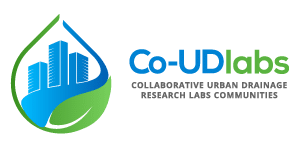Co-UDLabs/IWGDM Fair Urban Drainage Data Workshop: Data Models
A joint activity of the Co-UDlabs project and the IWA International Working Group of Data and Models
Summary by Jörg Rieckermann and Alfredo Chavarria, Eawag
This workshop reported on current and future work on data harmonization and developing Open Data models for FAIR urban drainage data on 15.5.2025. It brought together experts to advance FAIR (Findable, Accessible, Interoperable, Reusable) data principles in the urban drainage field. If you are interested in collaboration, please contact the individual group leaders via email.
Intro – Alfredo Chavarria opened the session by situating it within the broader Co-UDLabs project and ongoing efforts by the International Working Group on Data Models. A current problem is that we are lacking the concepts and implementations to pull existing dataset together, e.g. to apply machine learning methods to massive datasets, or re-use costly analytical data, such as micropollutant measurements.
Semantic web concepts and tools – Luís de Sousa (Técnico Lisboa) emphasized the importance of semantics and ontologies for reusability. He introduced the distinction between urban water infrastructure (subject) and the data collected (object), advocating for shared vocabularies to give data lasting value across contexts. He highlighted the benefits of connecting to existing initiative, e.g. OGC Water Quality Interoperability Experiment [1].
OpenSense success story – Martin Fencl (CTU Prague) presented work from the OpenSense initiative, focused on harmonizing data from unconventional rainfall sensors like microwave links and personal weather stations. He detailed a community-developed format supporting NetCDF and CSV that improves interoperability and reproducibility, which was published in “Open Research Europe” [2]. The OpenSense are thinking about standards for real-time data sharing, which is more complex. A key takeaway from the discussion was the shared interest in co-authoring a scientific publication to provide motivation and support of the group.
Flow and level data – Jörg Rieckermann (Eawag) highlighted the need for harmonized flow and level data to enable machine learning applications. He pointed to anomaly detection as a promising use case that, like language models, requires large standardized datasets. He discussed a comparison of how Flow Meter Data are represented in current standards such as the Dutch urban water Dictionary (GWSW, NL) and a Swiss Data Model (VSA-DSS, CH) [3, 4].
Urban flood simulation data – João P. Leitão (Eawag) addressed the challenges of defining minimal yet useful data structures for flood model calibration and validation. He emphasized the potential of machine learning for fast inundation modeling and raised questions about which attributes—units, location formats, and time resolution—should be standardized.
Combined Sewer Overflow spill data – Alma Schellart (Uni Sheffield) reviewed the UK STREAM model for sharing CSO (Combined Sewer Overflow) event data, which is now openly available for the UK in real time from the utilities [5] and being re-used by other stakeholders [6]. She critiqued inconsistencies in formats used by utilities and shared lessons from a PhD project using the data for AI modeling.
Water Quality Data – Lena Mutzner (Eawag) introduced a draft metadata schema for emerging pollutant monitoring, developed in community workshops by the JCUD International working group on Emerging Contaminants. She stressed the need for input beyond academia to ensure the schema’s real-world utility and future adaptability [7].
If you are interested in contributing or learning more, please reach out directly to the respective group leaders via email. Follow-up dates are planned on 16.6. and 15.7. and at the UDM conference at Innsbruck.
Programme and slides:
- 12:00 – Welcome and introduction (Alfredo Chavarria, Eawag)
- 12:05 – How to invest data with meaning – semantic web concepts and tools (Luís de Sousa, IST, Uni Lisbon)
- 12:15 – A data model for opportunistic rainfall sensors (Martin Fencl , CTU Prague)
- 12:25 – Flow and water level data (Jörg Rieckermann, Eawag)
- 12:35 – Urban flood simulations (Joao Leitão, Eawag)
- 12:40 – CSO spills (Alma Shellart, Sheffield University)
- 12:45 – Water quality data (Vincent Pons et al., NTNU)
- 12:50 – Next steps and group organization (Jörg Rieckermann, Eawag)
References
[1] https://www.ogc.org/initiatives/waterqualityie/
[2] https://open-research-europe.ec.europa.eu/articles/3-169
[4] https://www.vsa.ch/models/2020_1/VSA_DSS_2020_1_2_d_LV95-20231018.ili
[5] https://www.streamwaterdata.co.uk/pages/storm-overflows-data
